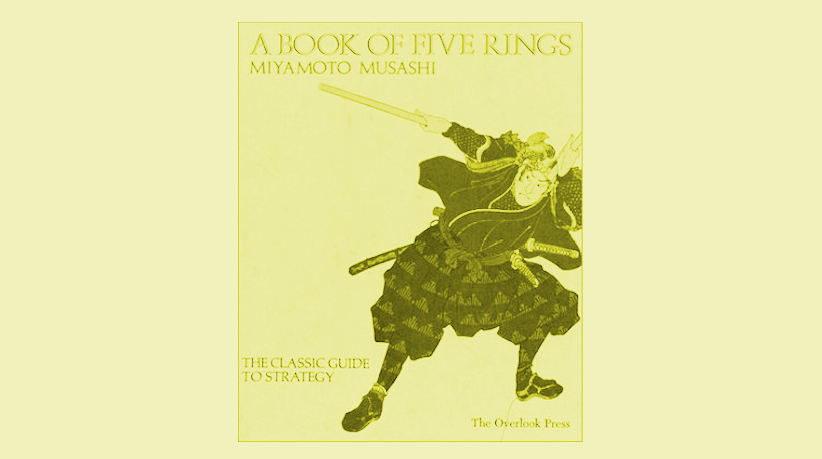If there was to be a book equivalent to Sun Tzu’s Art of War for the land of the rising sun, it would be the one we are going to deal with today: the book of the 5 rings (also called the book of the 5 wheels) by Miyamoto Musashi. Much more than a military strategy book, it is a philosophical work allowing us to solve life’s dilemmas and to have a deep reflection on existence.
Who was Musashi?
He was a samurai who lived between the end of the 16th and the beginning of the 17th century. His life is remarkable in the sense that Musashi is said to have won over 60 duels. After coming out alive from a battle lost by his side (the Battle of Sekigahara), he began to lead a life of wandering, of ronin in short. During his wanderings, he meets hostile nobles who do not hesitate to challenge him to a duel, which he wins one by one.
More than a master of swordplay, Musashi also reveals himself as a kind of ascetic monk. Indeed, the last years of his life were spent writing and philosophizing about the reasons for his martial success and the meaning of life. He ended up writing the treatise of the 5 rings which is a classic of Japanese literature. Serving as a guide for businessmen or people in search of meaning, it enlightens us at least on the concept of action without thought. The book has a Zen Buddhist and Shinto influence, which is normal. The author lived at a time when these currents of spiritual thought (even animistic for Shintoism) were in the era of time. He was impregnated with them, as were all the Japanese of his generation, and this until recent times.
The book, as its name indicates, is articulated around 5 chapters presented in the form of an element that takes up (and slightly modifies) the theory of the elements present in Taoist thought. Each of them deals with a dimension of life and conflict: from the most superficial to the most profound. Let’s see in more detail what it is about:
The earth: grounding yourself in the soil to find the true path
→ Introduction on martial arts, tactics and training.
He begins by reminding us that the martial way is a way like any other. Just as there is the Buddha way of finding enlightenment (or the Confucian way of reforming men through study), the martial way he calls the way of strategy is to excel in all circumstances. When one pursues the way of strategy, one can apply it to other dimensions of life, not only to military things. You must master and know the rhythms of the path of strategy. In everything there is a rhythm that you must identify as being either supportive or leading you to decline. Knowing the rhythms takes a lot of practice. This is related to the cycles of nature, life etc. The one who is in tune with the ambient rhythms thrives, while the one who ignores the rhythms runs the risk of being lost.
He concludes this chapter with 10 rules to follow in daily life:
– Do not have perverse thoughts
– To forge oneself in the way by practicing oneself (and not by intellectualization): the importance of training
– To embrace all the arts and not limit oneself to one
– To know how to distinguish the advantages and disadvantages of each thing.
– To know the way in each profession
– In everything, get used to an intuitive judgment
– To know by instinct what you cannot see
– Don’t do anything unnecessary
Water: hone your individual skills to perfection
→ Basic techniques and fundamentals
The path to strategy involves cultivating a mindset that is the same whether you are in your daily life or on a battlefield. You must cultivate a kind of intensity and detachment at the same time. You must behave in all circumstances without excessive tension or relaxation. At all times your mind must be calm and determined. If your body is quiet, do not relax your mind and vice versa. Even if you appear insignificant or fearful, inside you must be completely resolute. Do not let your enemies guess your state of mind.
Fire: take the fight to your enemies without fear
→ Tactics for duels and on the battlefield.
This is about developing the careful attention of the mouse while having the exceptional courage of the bull. You must forge yourself in the way by practicing it night and day.
To defeat an enemy, you must defeat his mind. If you beat him only superficially, by technique, he will rise from his ashes like a phoenix.
In a fight, you must not give your opponent the opportunity to come to his senses. You must perceive his actions while they are still in the germ stage in his mind in order to stop the attack before it has even begun. You must become like the opponent and adopt his point of view, feel what he feels. In return, you must “contaminate” your opponent’s mind in order to gain an advantage. If you fight with an empty mind, your opponents will have no hold on you, no matter how much they want to harm you. Know how to be slow and indecisive at the beginning so that you can surprise him with a change of pace that he is not expecting.
Wind: study your competitors’ methods
→ Critique traditional learning paths.
This is a critical study of the sword schools that were teaching in his time.
The void: cultivate the proper mindset
→ The samurai ideal
Musashi ends his work with a reference to the element of emptiness. A fencer became a master primarily because he was able to cultivate an “empty mind.” The idea being to have worked and repeated techniques so much that they become intuitive so that one does not need to think about them anymore to perform them. Here it is the state of mind that one must work on by having a Zen approach in a way. The emptiness is close to the idea of “non-thinking” present in Zen. The warrior who approaches a situation detached from all thought can give free rein to his spontaneity and his intuitive ability to react.
Miyamoto Musashi’s manifesto, the Dokkōdō, the Way of Solitude:
1. Accept everything just the way it is.
2. Do not seek pleasure for its own sake.
3. Do not, under any circumstances, depend on a partial feeling.
4. Think lightly of yourself and deeply of the world.
5. Be detached from desire your whole life long.
6. Do not regret what you have done.
7. Never be jealous.
8. Never let yourself be saddened by a separation.
9. Resentment and complaint are appropriate neither for oneself or others.
10. Do not let yourself be guided by the feeling of lust or love.
11. In all things have no preferences.
12. Be indifferent to where you live.
13. Do not pursue the taste of good food.
14. Do not hold on to possessions you no longer need.
15. Do not act following customary beliefs.
16. Do not collect weapons or practice with weapons beyond what is useful.
17. Do not fear death.
18. Do not seek to possess either goods or fiefs for your old age.
19. Respect Buddha and the gods without counting on their help.
20. You may abandon your own body but you must preserve your honour.
21. Never stray from the way.





